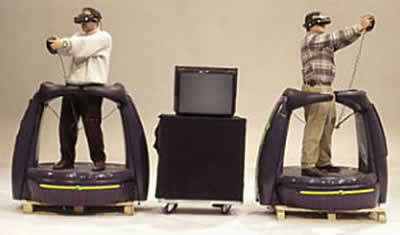More than 20 years ago I first experienced virtual reality in one of those large-scale 3D rigs which was traveling the country, setting up shop in the local multiplex cinema and charging you a small fortune to step into a 4-by-4 foot contraption, strap on a pair of 3D goggles, grab a plastic gun and hunt down some aliens in an immersive 3D environment.
It’s funny - as unimpressive as the graphics were, as much as the delay between movement and visual update was puke inducing – I still have vivid memories of the game and the incredible experience of literally stepping into a new world.
Fast forward to last year: Oculus revived the whole Virtual Reality (VR) scene with their Rift headset – cobbled together with cheap off-the-shelf components and some clever hardware and software hacking. The first time I tried the Rift I was hooked. It was the exact same crazy experience I had some 20 years ago – I found myself in a new world, just this time with much better graphics, none of the nasty visual delays (which makes most people motion sick) and all delivered in a much more palatable device. And again, I can’t get that initial experience out of my head (in my case a rather boring walking experience of a Tuscan villa).
Since that experience, I joined Singularity University where we have a Rift in our Innovation Lab. Over the course of the last 8 weeks I must have demoed the Rift to at least 30 people – and they all react in the exact same way:
People giggle, laugh, scream, start moving with the motion they see in the headset… They are lost within the experience in less than 30 seconds of putting the goggles on. The last time I’ve seen people react emotionally in a similar way to a new piece of technology was when Apple introduced the iPhone.
It’s rare to see a piece of technology create such a strong emotional reaction (delight!). And that’s precisely the reason why I believe VR will be huge. A game changer. The entry vector will be gaming – with serious applications following suit (think about use cases in the construction industry, engineering, visualization of complex information) and immersive storytelling being probably the biggest game changer. In the future you will not watch a movie or the news – you will be right in it. You will shop in these environments. You will not Skype but literally be with the other person.
And by being instead of just watching we will be able to tap much deeper into human empathy than ever before. To get a glimpse of this future, check out these panoramic pictures of the destruction in Gaza.
With prices for VR technology rapidly approaching zero (the developer version of Oculus Rift’s DK2 headset is a mere $350 and Google already introduced a cardboard (!) kit which turns your Android phone into a VR headset) and software development tools becoming much more accessible, we are rapidly approaching the point where the tools of production become so accessible that we will see an incredible variety of content being produced. And as VR is not bound to a specific hardware platform, I believe we will see a market more akin to the Internet than the closed ecosystems of traditional game consoles or mobile phone app stores.
The future of virtual reality is nigh. And it’s looking damn real.


